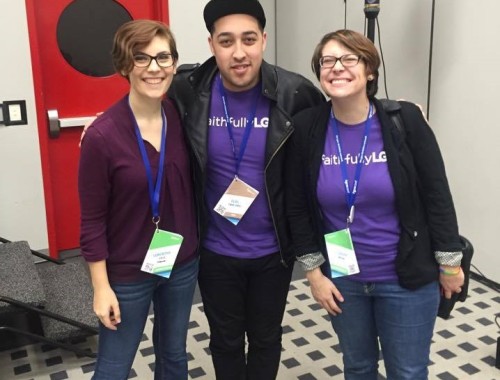Today’s guest post is from Cassidy, who dissects different ideas embedded in Christian fundamentalist culture at Roll to Disbelieve. “Learning the Words” is a series on the words many of us didn’t have in fundamentalism or conservative evangelicalism– and how we got them back. If you would like to be a part of this series, you can find my contact information at the top.
I grew up Catholic, and there’s not a word more hated and feared in Catholicism as much as these two syllables: “selfish.” Every story I ever heard as a child drilled down on “selflessness” and “sacrifice,” especially for women. Every family value centered on sacrificing my own needs to advance the whole. I didn’t even question this virtue.
I converted to Protestantism in my teens, working my way through denominations till I reached fundamentalism, and in fundamentalism I learned entirely new reasons to hate and fear selfishness. The rigid gender roles and bizarre hierarchical system I was taught depended upon ignoring my own needs to meet the needs of those around me– especially my husband. This image of “selflessness” dominated what women in my church were taught– always, always, we were to give way to others. This was how we were told we could serve our god, and how we would build happy homes and marriages. That it felt so distinctly abusive and did not seem to be working in our home lives the way we’d been promised it would? That was our fault too. We just needed to be less selfish.
Even after leaving my husband and Christianity, “selfish” was still a word I feared. I couldn’t just want something for myself, I had to be able to justify it. I couldn’t even say “no” unless I had a really good excuse. I couldn’t just not want to have kids. I had to have some very good excuse for not wanting kids–to “purchase” my right to not have children with how much I was contributing to society and how much I really loved children deep down. I couldn’t even just not be a Christian–most Christians seem to think that ex-Christians left because of “selfishness,” and I’ve certainly been accused of it more times than I can count.
You can probably guess that even after leaving the religion, my relationships were in shambles. I lacked any concept of boundaries. As a Christian I’d been taught that couples were “one flesh,” so boundaries were considered quite selfish. That’s some hard indoctrination to lose! My next partner, who wasn’t even a Christian, quickly discovered that accusations of selfishness worked marvelously well to keep me in line.
One day I realized that these accusations of “selfishness” he was always lobbing at me were over perfectly reasonable needs. I was “selfish” to refuse to give him more drug and booze money, or to refuse to do all the housework and work full-time besides, or to demand respect and courtesy. I was so very, very selfish.
I began to look back at all the other times I’d been accused of selfishness. Without hardly any exceptions, these accusations were hurled over similar concerns. It wasn’t “selfish” to not want kids. It was what I needed to do with my life to be an authentic and happy person. It wasn’t “selfish” to want to study what I studied in school, or to get a divorce from my overbearing, stalking, abusive preacher ex-husband, or to demand my partner share equally in the housework if we were both working full-time, or to leave a religion that had proven downright toxic to my mental and emotional health.
I began to see these accusations of selfishness in a much larger context–in the context of “what makes accusers really uncomfortable with what my refusal means.” I began to realize that it was the people who lobbed these accusations that stood to gain by my acquiescence. I began to notice that these accusations often got flung in absence of what was good for me as a person, but that they were often the things that would allow the accusers to maintain their dominance. It seemed a little odd that these accusations seemed to be used in a way that strong-armed me–that once someone had said the magic S-word, all discussion stopped. But wouldn’t it seem like the folks who are getting their way are really the selfish ones in these situations? Who’s really selfish, the person being cowed and forced into line, or the person who gets to declare by fiat who is and isn’t selfish, who gets to make another person’s most private decisions?
I began to realize that the decisions they labeled “selfish” were decisions that challenged my accusers on a number of levels. Thus, I had to be silenced.
I still remember the day I realized I didn’t have to “purchase” my personal decisions or convince anybody of their validity. I didn’t have to talk someone into accepting my personal decisions. That day, I learned to separate out my needs from those of my group. I remember realizing that it was hugely suspicious that what my accusers thought was “selfish” was really just me doing or saying something that made their privilege look too obvious or too negative.
The journey began with a single step: the first “no.” The first refusal. The first insistence on boundaries… and it got easier every time. Now, it’s second nature.
I know now that “selfishness”—as defined by fundamentalists– is actually a healthy trait. I do not fear it or the accusation of it. I know that each one of us must balance our own needs with that of society and decide what we need for ourselves to be healthy and happy–and that it’s not “selfish” at all to make those sorts of decisions. I’ve learned how to separate out “stuff that impacts others and thus deserves consideration” and “stuff that doesn’t impact anybody but me and therefore it doesn’t matter what others think of my decision either way.”
I know that it’s okay to do things for myself. I know it’s fine to say “no” if acquiescing would make me feel overextended. I know that boundaries are a very healthy thing in relationships and that over-enmeshment (and the contempt that it breeds) is the real enemy. I know that sometimes we have to limit what we give of ourselves so we can maintain our sanity. If group unity depends upon me being abused or feeling over-extended or harmed, then maybe the group is the problem–not me.




